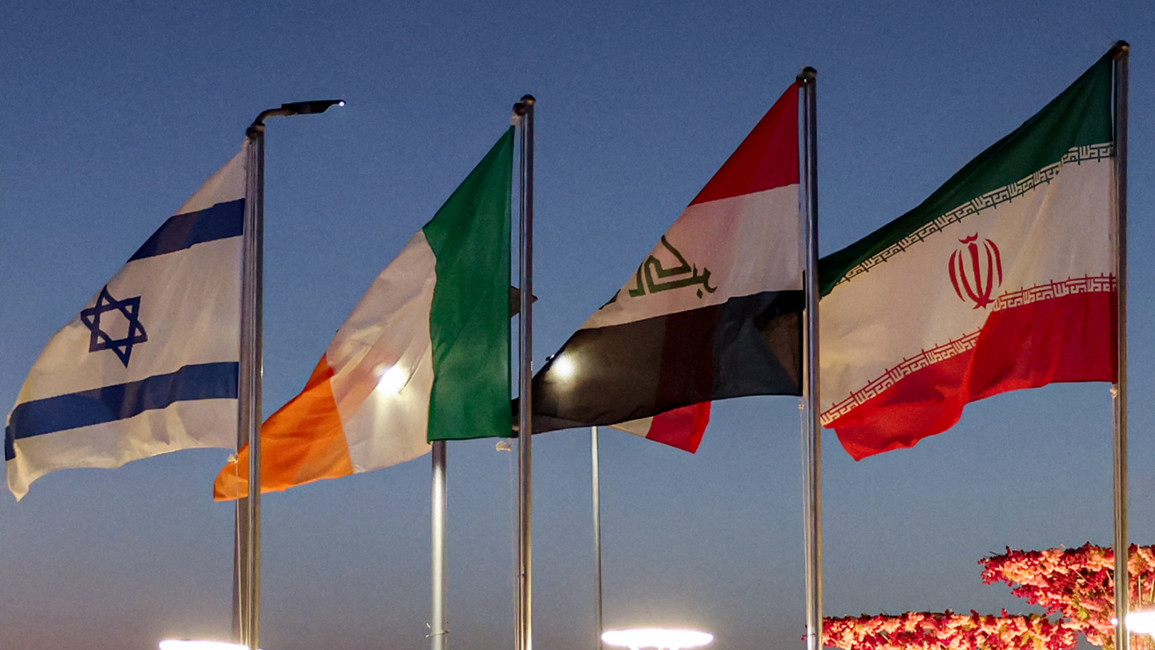Iraqi officials criticised for sitting next to Israeli minister at COP27
The participation of an Iraqi delegation at Egypt's COP27 Climate Change Conference, which an Israeli minister attended, went viral as the Iraqis considered it as a beginning of 'normalisation with the Zionist entity.'
COP27 is being held at the Egyptian resort of Sharm el-Sheikh from 6-18 November. It has brought together politicians from Israel, Egypt, Lebanon, Jordan, Cyprus, Saudi Arabia, Oman, Bahrain, Qatar, the Emirates, Iraq, Kuwait and the Palestinian Authority.
Iraq's president Abdul Latif Rashid and Iraq's foreign minister Fouad Hussein, both Kurds, headed a formal delegation at the conference.
The office of the Israeli Environmental Protection Minister Tamar Zandberg said in a statement that she, alongside Iraqi and Lebanese leaders, participated in the conference, where the group "pledged to work together to tackle climate change."
In photos provided by her office, she is seated behind a small Israeli flag. Two seats away from her are the Iraqi president and across the room is Lebanese Prime Minister Najib Mikati, each behind their countries' flags.
The photos went viral by Iraqi social media users, especially on Twitter by loyalists of Shia cleric Muqtada al-Sadr, whose parliamentary bloc in May orchestrated the passing of a law criminalising any form of normalisation with Israel.
🚨عـــاجــل || #بـابـل
— 𓆩𝒵𝒜ℋℛ𝒜𓆪 (@afrahabd77) November 9, 2022
• وقفة احتجاجية ضد جلوس رئيس حكومة التبعية مع ممثل اسرائيل في اجتماع واحد في مصر. #كلا_كلا_للتطبيع#تطبيع_حكومة_الاطار_لن_يمر pic.twitter.com/TjzgNAjoJh
Sadr supporters accused the pro-Iran government of PM Mohammed Shia al-Sudani of attempting to initiate normalisation with Israel.
Angry supporters of Sadr in Babylon province and elsewhere burnt Israeli flags and threatened the Iraqi government of retaliation upon such actions.
The New Arab spoke with a high-level official in the Iraqi government on the issue, but he refused his statements to be used as attribution.
"Leave this issue…no one can boast about Iraq's position on the Palestine issue. Our position is clear. Iraq's government and people have always supported the Palestinian people at all the international forums, even if the enemies of the Palestinian issue were attending," the Iraqi official said.
Muthana Amin, a Kurdish lawmaker from the Kurdistan Islamic Union (KIU) and member of the Iraqi parliament's foreign relations committee, told TNA that "Iraq's participation at COP27 neither begins normalisation with Israel nor has anything to do with Iraq's anti-normalisation law. Israel is being invited for conferences organised by the UN; it is unfeasible for Iraq to boycott any conference attended by Israel."
According to the law, published by Iraq's state media in Arabic, all Iraqis, whether inside or outside the country, as well as state officials, including those in the northern Kurdistan region, government institutions, private sector companies, the media, foreign companies and their employees, are banned from establishing relations with Israel, visit the country, or promoting normalisation.
The law stipulates that any Iraqi who visits Israel will be sentenced to life imprisonment, and those who establish any political, economic, or cultural relations with Israeli institutions, even through social media networks, will be sentenced to the death penalty.
In a move slammed by much of the Arab world and the Palestinians as a betrayal, four Arab countries - the United Arab Emirates, Sudan, Bahrain, and Morocco - established diplomatic relations with Israel as part of the Abraham Accords, a US-led joint Middle East peace initiative.
Iraq, for its part, has never recognised Israel since its establishment in 1948 by ethnically cleansing the indigenous Palestinian population.




